Agave: Is it Safe to Offer Babies Agave in Place of Added Sugar?
- What agave is and why it's not technically an added sugar, but also something your baby definitely doesn't need
- Why agave syrup appeals to adult populations - but for health reasons that don't exactly pertain to infants
- How agave does not help babies with coughs to alleviate pain associated with pediatric coughing
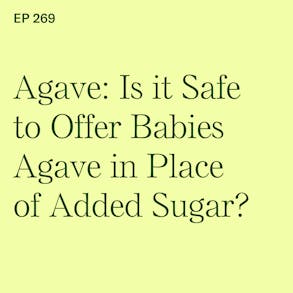
LISTEN TO THIS EPISODE
Episode Description
Is it safe to offer babies agave? Is it really a “natural” sugar and is it less harmful for babies than other added sugars? In this episodes we’re looking at agave and whether it is a food to include in the infant weaning diet, potential health benefits and drawbacks for agave offered to infants.
Links from this Episode
- Baby-Led Weaning with Katie Ferraro program with the 100 First Foods™ Daily Meal Plan, join here: https://babyledweaning.co/program
- Baby-Led Weaning for Beginners free online workshop with 100 First Foods™ list to all attendees, register here: https://babyledweaning.co/baby-led-weaning-for-beginners
Other Episodes Related to This Topic:
- Episode 68 - Sugar and Why Your Baby Should Avoid it with Robert Lustig, MD, MSL
- Episode 99 - Are Organic Foods Better for My Baby?
Resources & Research
- Paul, Ian M et al. “Placebo effect in the treatment of acute cough in infants and toddlers: a randomized clinical trial.” JAMA pediatrics vol. 168,12 (2014): 1107-13. doi:10.1001/jamapediatrics.2014.1609
- Cohen, Herman A. “Demonstration of placebo effect for nonspecific cough medicine.” The Journal of pediatrics vol. 166,5 (2015): 1321. doi:10.1016/j.jpeds.2015.02.060
- UCSF Sugar Science site: https://sugarscience.ucsf.edu/
- López-Velázquez, Gabriel et al. “Effects of Fructans from Mexican Agave in Newborns Fed with Infant Formula: A Randomized Controlled Trial.” Nutrients vol. 7,11 8939-51. 29 Oct. 2015, doi:10.3390/nu7115442
- Hooshmand, Shirin et al. “Effects of agave nectar versus sucrose on weight gain, adiposity, blood glucose, insulin, and lipid responses in mice.” Journal of medicinal food vol. 17,9 (2014): 1017-21. doi:10.1089/jmf.2013.0162
- García Contreras, Andrea A et al. “Lactobacillus reuteri DSM 17938 and Agave Inulin in Children with Cerebral Palsy and Chronic Constipation: A Double-Blind Randomized Placebo Controlled Clinical Trial.” Nutrients vol. 12,10 2971. 28 Sep. 2020, doi:10.3390/nu12102971
- Saraiva, Ariana et al. “Agave Syrup: Chemical Analysis and Nutritional Profile, Applications in the Food Industry and Health Impacts.” International journal of environmental research and public health vol. 19,12 7022. 8 Jun. 2022, doi:10.3390/ijerph19127022

Latest Episodes
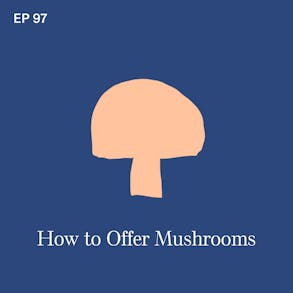

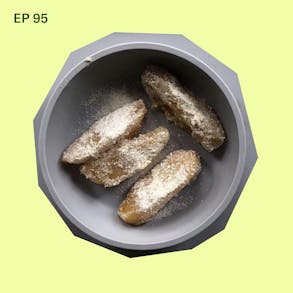
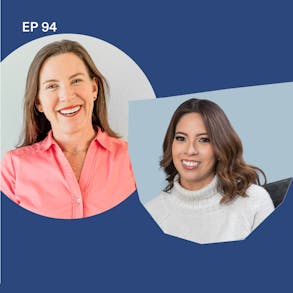

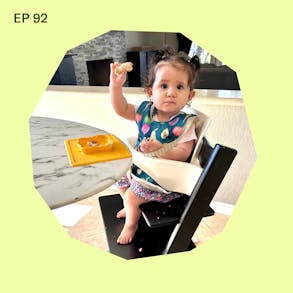
Katie Ferraro (0s):
And so the benefits of agave and why it's gained so much in popularity in recent years has a lot to do with adult weight management and blood sugar control issues. Lower glycemic index, it's also a vegan food, but many of these concerns aren't really applicable when we're looking at offering it to infants. Hey there. I'm Katie Ferraro, registered dietitian, college nutrition professor and mom of seven specializing in baby led weaning here on the Baby-Led Weaning Made Easy podcast I help you strip out all of the noise and nonsense about feeding, leaving you with the confidence and knowledge you need to give your baby a safe start to solid foods using baby-led weaning.
Katie Ferraro (41s):
Hey guys, welcome back. Today we're talking about agave and is it safe to offer babies agave in place of added sugar. Now parents and caregivers are rightly concerned about added sugars. You might have heard the American Academy of Pediatrics actually recommends no added sugars in food or drinks for children up until age two. But agave can get a little confusing cuz it's technically a natural sweetener. So is it something that we want to or could include in our baby's diet? So hang tight today we're gonna break down what agave is and what the potential benefits for utilization, you know, properties are, why adults use it, and then why that doesn't exactly extrapolate to the infant population. So what is agave?
Katie Ferraro (1m 22s):
Agave is a natural sweetener and agave syrup also referred to as agave nectar. It's relatively new in the food market. It's actually like in the 1990s when it was, you know, starting to be marketed as this alternative sweetener. Now it's made from the agave plant, which is nothing new. The sugars in agave are actually fermented to make tequila and that's of course not a food that we feed to our babies. But it's gained in popularity because of its low glycemic index and its vegan status. So I have a background in diabetes. I'm actually a certified diabetes educator and so when I worked previously with, you know, adult populations with diabetes and we're looking at alternative ways to sweeten foods without increasing the glycemic load or glycemic index and agave is something that we sometimes would talk about.
Katie Ferraro (2m 5s):
But as far as your infant population goes, at the end of the day, even though agave is a a low GI food, meaning it won't spike your baby's blood sugar in the same way nearly every other sweetener, well you know, unless your baby has diabetes and you're working with a registered dietitian and you know, carb counting, etcetera, that's really a moot point. And at the end of the day, we don't wanna be offering babies foods that we have sweetened, right? We want babies to learn how to taste the food and to get the nutrients from those foods that they're trying as well as the flavor experience. And the taste, And the texture. And then we don't need to be masking any flavors with agave. So, I kind of lump, even though it's not technically an added sugar and from botanical standpoint is considered to be a "natural sweetener".
Katie Ferraro (2m 47s):
At the end of the day, we have to look kind of zoom out and say," Well, why would we be adding agave to foods?" And people are like,"Oh, it's baked goods that I'm making for my baby." Well, you know, why are we making desserts for a baby when babies have all of these other natural wholesome foods that they could be eating, you know, well in advance of trying those sweet foods. So the potential benefits of agave, again, mostly kind of apply to the adult population, the lower GI and, the breakdown of, you know, the sugars and how it differs from other sugars. And if you're interested in learning a little bit more about the biology of sugar in the human body and how it affects babies, I actually had Dr. Robert Lustig on the podcast a while back. Dr. Lustig is leading researcher in the sugar realm.
Katie Ferraro (3m 27s):
I previously taught nutrition at the University of California at San Francisco where Dr. Lustig's research is based out of. So, I knew him as a colleague there and then he graciously came on the podcast to teach about why sugar and and your baby should avoid sugar. That's episode 68 if you're interested in learning more about kind of the biology of sugar. But back to the Agave reasons why it's sometimes considered to be beneficial has a lot to do with the lower GI. To be honest. There's no real benefits of agave syrup compared to any other sweetener. I was looking at some other research actually from San Diego State University. I teach nutrition there as well and is looking at some of the research that Professor Hooshman in our department did about how agave in adults can have a positive influence on weight gain and glucose control.
Katie Ferraro (4m 10s):
But again, these are not primary concerns in the weaning diet for our neurotypical healthy population. As far as infants in agave use goes, they did find one study looking at the benefits of agave for use in children with cerebral palsy and chronic constipation. Okay, so the agave did improve the stool characteristics like reducing painful defecation in these children. But again, that was limited to babies with cerebral palsy and chronic constipation. Another area where you might have heard of agave as being relevant or pertinent in Infant nutrition or Infant health has been about agave and cough. So there's been a lot of promotion of agave as a quote unquote natural remedy for cough for babies cuz of course we don't use traditional ingredients used in cough syrup for babies.
Katie Ferraro (4m 55s):
So everyone's always looking for a natural cough remedy. Multiple studies have shown that agave is actually at, has no real discernible effect. Generally placebo effect the baby does not recover or feel soothed any faster. Oftentimes it's just the parents reporting that they, they feel less worried after giving agave. To summarize, agave isn't necessarily unsafe, but it certainly should be limited in the same way that all other sugars for babies are limited. We wanna keep sweetener doses small or out of the picture if at all possible. We offer foods that have naturally occurring sources of sugar. So for example, if we're looking at, if you're choosing foods from the 100 First Foods list, For example, and getting foods that are in the fruit vegetable, there's naturally occurring fructose in there.
Katie Ferraro (5m 37s):
To a lesser degree, there's carbohydrate and sugars in vegetables less so than fruits, but starchy foods certainly contain carbohydrates. And again, we want babies to be getting those naturally occurring sources of sugar and not really sweetening other foods with them. One other thing I did see is like if you're absolutely hell bent on using agave, I thought it was an interesting tip. This was another registered dietitian's article mentioning that like if you're actually buying agave, and this might go if, you buy it for yourself as an adult, but to really look for USDA organic agave, because a lot of it that comes from Mexico, nearly all agave sold in the United States is imported from Mexico. In our Food and Drug Administration. The FDA has actually refused some shipments from Mexico due to excessive pesticide residues.
Katie Ferraro (6m 18s):
So one thing you can do is check for that U S D A certified organic seal or an independent global organic certifier that's accredited by the U S D A If. You are indeed going to utilize agave and maybe to some degree in your baby's diet as well if you're interested in learning more about organic and what does that actually mean as far as a classification and a certification process. I did another episode about organic foods that was episode 99. Is Organic Foods Better for My Baby? Kind of explain the U S D A organic process and which foods you might consider buying organic for your baby. But as far as agave goes, I would say when in doubt, leave it out.
Katie Ferraro (6m 60s):
Really no benefits for it. And we don't want BABY to get in the habit of expecting foods to taste artificially sweet or unnecessarily sweetening foods when they could be tasting and benefiting from the naturally occurring flavors and tastes and textures present in all of the different foods that we're trying. So If, you need ideas on foods to feed your baby. I do have a hundred First Foods list. I give it away free to everybody on my weekly one hour online video workshop called Baby led Weaning for BEGINNERS. You can sign up for this week's workshop times@babyledweaning.co and I'll link to all of the resources from today's episode on the Shownotes at BLW podcast.com/ 2 6 9. Thanks for listening.

The Program Baby-Led Weaning with Katie Ferraro
A step-by-step digital program for starting solid foods safely and navigating the original 100 FIRST FOODS™ meal plan with baby-led weaning.
 EXPERT-LED, PROVEN APPROACH TO EATING REAL FOOD
EXPERT-LED, PROVEN APPROACH TO EATING REAL FOOD CONCISE VIDEO TRAININGS TO MASTER BABY-LED WEANING
CONCISE VIDEO TRAININGS TO MASTER BABY-LED WEANING 100 FIRST FOODS DAILY MEAL PLAN WITH FOOD PREP VIDEOS
100 FIRST FOODS DAILY MEAL PLAN WITH FOOD PREP VIDEOS
Baby-Led Weaning for Beginners Free Workshop
Is your baby ready to start solid foods, but you’re not sure where to start? Get ready to give your baby a solid foundation to a lifetime of loving real food…even if you’re feeling overwhelmed or confused about this next stage of infant feeding.
Get baby-led weaning recipes and tips delivered to your email inbox.

